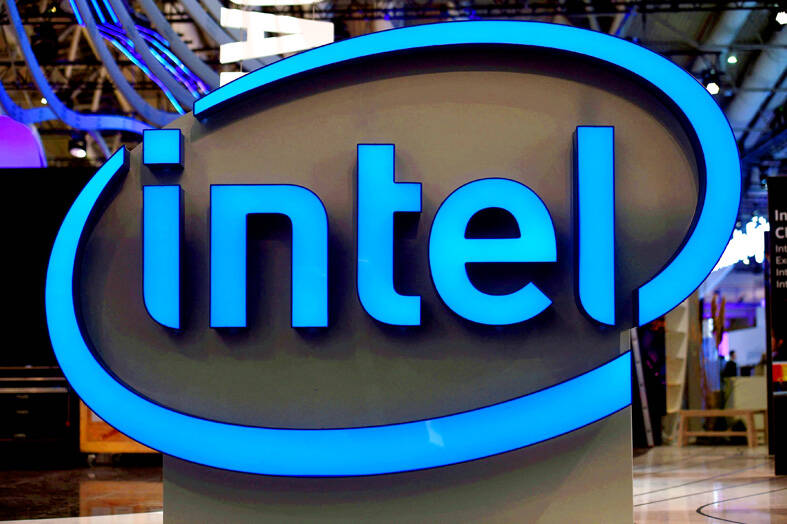Intel Corp is to delay construction of its planned German chip plant and is seeking more in government subsidies, Volksstimme reported.
The US-based chipmaker earlier this year announced plans for a mega site worth 17 billion euros (US$18 billion) in Magdeburg. Construction was set to begin by the middle of next year, and the German government planned to provide 6.8 billion euros in state aid.
The cost has risen to 20 billion euros, Volksstimme reported.

Photo: Reuters
Intel no longer has a planned start date for construction and wants the German government to increase subsidies, the report said.
Although Intel has not made any official announcements about a delay, it said in a statement on Saturday that “much has changed” since the company disclosed plans to build in Magdeburg.
“Geopolitical challenges have become greater, semiconductor demand has declined, and inflation and recession are disrupting the global economy,” the statement said.
The company is monitoring the situation, and “will pace these investments with the market,” it said. “We cannot predict the market recovery, but we do know it will recover as it always has in the past after a down cycle.”
The EU has an ambitious goal of producing 20 percent of the world’s chips by 2030.
The European Chips Act is still moving through the legislative process, but has already prompted a number of companies to make investments, of which Intel was the largest. High energy prices, a market downturn and even subsidies from the US’ Inflation Reduction Act could threaten the plans.
Meanwhile, former Volkswagen AG chief executive officer Herbert Diess is set to become chairman of the supervisory board at German semiconductor manufacturer Infineon Technologies AG, the company said on Friday.
Diess “is expected to assume the role,” subject to a vote at an annual general meeting in February, taking over from Wolfgang Eder, Infineon said.
Eder, who has been in the position since 2019, said Diess was “the ideal candidate to become my successor, touting his “excellent knowledge of the company and of the industry landscape.”
Infineon last month unveiled plans for a 5 billion euro new factory in the eastern German city of Dresden, as Europe races to reduce its reliance on semiconductors made in Asia.
A global shortage of semiconductors, spurred by a COVID-19 pandemic boost in demand for consumer electronics, has snarled international supply chains and forced manufacturers to trim production in a range of industries.
German vehicle manufacturers have been among those hit hard, as semiconductors are a crucial component in both conventional and electric vehicles.
Diess stood down as chief executive officer of Volkswagen in September, handing the wheel to former Porsche AG chief executive Oliver Blume after four turbulent years in charge.
Under Diess, Volkswagen became the first legacy vehicle maker to try to follow US upstart Tesla Inc by seeking to develop centralized electronic vehicles.
However, the drive proved controversial, with critics saying that Diess had moved too fast, while underestimating how complicated it was to shift in-house an operation that was not among the vehicle maker’s core expertise.

TAKING STOCK: A Taiwanese cookware firm in Vietnam urged customers to assess inventory or place orders early so shipments can reach the US while tariffs are paused Taiwanese businesses in Vietnam are exploring alternatives after the White House imposed a 46 percent import duty on Vietnamese goods, following US President Donald Trump’s announcement of “reciprocal” tariffs on the US’ trading partners. Lo Shih-liang (羅世良), chairman of Brico Industry Co (裕茂工業), a Taiwanese company that manufactures cast iron cookware and stove components in Vietnam, said that more than 40 percent of his business was tied to the US market, describing the constant US policy shifts as an emotional roller coaster. “I work during the day and stay up all night watching the news. I’ve been following US news until 3am

UNCERTAINTY: Innolux activated a stringent supply chain management mechanism, as it did during the COVID-19 pandemic, to ensure optimal inventory levels for customers Flat-panel display makers AUO Corp (友達) and Innolux Corp (群創) yesterday said that about 12 to 20 percent of their display business is at risk of potential US tariffs and that they would relocate production or shipment destinations to mitigate the levies’ effects. US tariffs would have a direct impact of US$200 million on AUO’s revenue, company chairman Paul Peng (彭雙浪) told reporters on the sidelines of the Touch Taiwan trade show in Taipei yesterday. That would make up about 12 percent of the company’s overall revenue. To cope with the tariff uncertainty, AUO plans to allocate its production to manufacturing facilities in

Six years ago, LVMH’s billionaire CEO Bernard Arnault and US President Donald Trump cut the blue ribbon on a factory in rural Texas that would make designer handbags for Louis Vuitton, one of the world’s best-known luxury brands. However, since the high-profile opening, the factory has faced a host of problems limiting production, 11 former Louis Vuitton employees said. The site has consistently ranked among the worst-performing for Louis Vuitton globally, “significantly” underperforming other facilities, said three former Louis Vuitton workers and a senior industry source, who cited internal rankings shared with staff. The plant’s problems — which have not

COLLABORATION: Given Taiwan’s key position in global supply chains, the US firm is discussing strategies with local partners and clients to deal with global uncertainties Advanced Micro Devices Inc (AMD) yesterday said it is meeting with local ecosystem partners, including Taiwan Semiconductor Manufacturing Co (TSMC, 台積電), to discuss strategies, including long-term manufacturing, to navigate uncertainties such as US tariffs, as Taiwan occupies an important position in global supply chains. AMD chief executive officer Lisa Su (蘇姿丰) told reporters that Taiwan is an important part of the chip designer’s ecosystem and she is discussing with partners and customers in Taiwan to forge strong collaborations on different areas during this critical period. AMD has just become the first artificial-intelligence (AI) server chip customer of TSMC to utilize its advanced